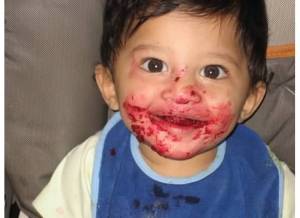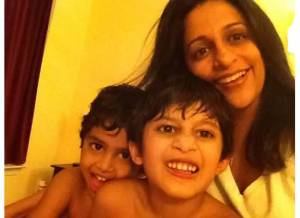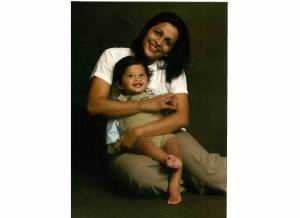By Brinda Nair
There’s a saying among us parents of kids on the spectrum – “I don’t need Autism awareness, Autism acceptance is just fine!” Autism acceptance is the first step but also the most difficult step for someone of South Asian descent. Tiger mom instincts don’t just run among moms, they extend to the rest of the family as well – family, extended family, it encompasses everyone. The need to excel and be the best is inherent in our nature and ingrained in us through our culture.
I’d like to share the story of my little boy, who is now 7 years old, and our story of acceptance. He  was born after 6 years of marriage and was the apple of our eyes, the first grandchild on both sides of the family. You can imagine the celebration! Beautiful, bright-eyed boy who grew up like a weed, healthy and happy. All our dreams had come true. However, as he grew I had a very small inkling, a small spidey sense of a worry seemed to plague me that something was wrong. He was not making eye contact, he had terrible tantrums, pulled people’s hair, and displayed some aggression. On the other hand he seemed very bright – knew all his letters, nursery rhymes, and even was able to write some letters at the age of 2. “He is very intelligent,” I thought.
was born after 6 years of marriage and was the apple of our eyes, the first grandchild on both sides of the family. You can imagine the celebration! Beautiful, bright-eyed boy who grew up like a weed, healthy and happy. All our dreams had come true. However, as he grew I had a very small inkling, a small spidey sense of a worry seemed to plague me that something was wrong. He was not making eye contact, he had terrible tantrums, pulled people’s hair, and displayed some aggression. On the other hand he seemed very bright – knew all his letters, nursery rhymes, and even was able to write some letters at the age of 2. “He is very intelligent,” I thought.
Then came the crushing blow, his pediatrician wanted to get him tested – she suspected autism. My husband and I had the sinking feeling that our lives would never be the same!
But then began the questions – the blame game, the denial, the disbelief, the awkwardness. Was it nature? Was it nurture?
The official diagnosis was Autism Spectrum Disorder (ASD). Autism, we told our family, but their explanations were a hundred others. The elders in the family denied it, “Oh he’s just naughty”, ”He’ll grow out of it”, “He’s very intelligent”, ”He knows so much”, “In America they overdo the testing!!”, ”there’s nothing wrong!!”. And on and on…
The grandmothers reacted differently. One took to prayers and visiting every God she could – it was her way of coping. The other took to denial, not telling anyone in the extended family, hiding the fact.
This is a typical story for other kids on the spectrum that I know of – some of whose grandparents back in India are not even aware of the diagnosis. Had their child had juvenile diabetes, would this be the case? In this day and age, the shame, the secrets, and the stigma are still very much present in our community.
After the initial shock, my husband and I decided to take matters into our own hands and help our little boy in the best way we could. Acceptance was primary, then came seeking the best help we could find and bringing all the resources we could muster to the fore. We decided to take Autism by the horns and not let it define our little boy.
 Today, our boy is a high functioning child who is verbal and is involved in several activities. He plays the piano, swims like a fish, and has a younger brother to whom he is very attached.
Today, our boy is a high functioning child who is verbal and is involved in several activities. He plays the piano, swims like a fish, and has a younger brother to whom he is very attached.
The rate of diagnosis of Autism is now at one in every 68 children in America. It is bound to touch each and every one of our lives in some way, if it hasn’t already. I thought I would give anyone recently diagnosed a few pointers that I feel helped us.
-
Allow yourself time to feel sad. Don’t let anyone rain on your denial phase. As a couple, you first need to wrap your heads around the diagnosis, its implications on your lives, and accept it before you tell the rest of your family.
-
Be open about the diagnosis. Parents, extended family, circle of friends – you need these people in your lives and cannot live on an island. Look for parents of older kids on the spectrum – they will be a phenomenal resource.
-
Avoid assigning blame. Don’t blame yourself or your spouse or either side of the family – the distant cousin who has an odd sense of humor or mannerisms, or seems different is not to blame. No one truly knows the cause of Autism so don’t try to point fingers.
-
Pick your battles. You will have plenty of them ahead of you so be thoughtful of where you invest your time and energy.
-
Pray for patience. Patience helps a lot. Meditation, yoga, prayer all seem to help. Investing time on yourself as a parent is very important.
-
Laugh. Even though you will occasionally feel like you’re losing your mind, do your best to keep your sense of humor. Seeing the lighter side of situations you face will help you in your daily endeavors!
And last, but not in any way the least – realize that you are your child’s best advocate. Rather than teaching your child about the world, in your case you have to teach the world about you child! As a parent a of kid with Autism I can say, without a doubt, you don’t know how strong you are until being strong is the only choice you have. When you add in the dimension of being South Asian it becomes immensely harder to accomplish something as seemingly simple as acceptance! As they say, Autism is not a choice, but Acceptance is!
 CHAI
CHAI
Beautifully written!!! Very touching and I agree with everything you said
Beautiful thanks for this awesome blog with a strong message to all .Hug and lot of wishes coming your way .shobana from FSBM (facebook )